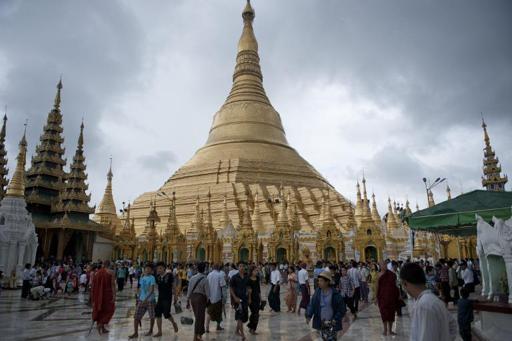Myanmar faces being called to account for stalling reforms when it hosts a top global diplomats at a security forum later this week, with religious clashes and curbs on press freedom taking the sheen off its emergence from military-rule.
The former pariah nation has enjoyed praise since a quasi-civilian government launched ambitious political and economic reforms three years ago, heralding the end of most Western sanctions.
But the international community has voiced increasing frustration as Buddhist nationalism appears to tighten its grip on the nation with fresh attacks against Muslims last month, while journalist arrests have also raised uncertainty over the extent of newly-won press freedoms.
Several Western nations have raised concerns over rights issues in Myanmar in recent weeks, but the main message is likely to come from US Secretary of State John Kerry as he tests the water ahead of a possible visit by President Barack Obama later in the year.
Meetings of the Association of Southeast Asian Nations, which will begin as regional foreign minister talks on Friday and widen to include world powers over the weekend, will likely be dominated by ASEAN wrangles with Beijing over the East Vietnam Sea, but Kerry is also likely to seek to raise Myanmar's rights record.
America's top diplomat will urge the government to protect all of Myanmar's people and "put in place greater safeguards for their human rights and fundamental freedoms", according to Danny Russel, US Assistant Secretary of State for East Asia and Pacific Affairs.
Talks on Sunday for the ASEAN Regional Forum are set to bring the regional bloc together with leading diplomats from global powers, including China, the European Union and the United States, which has touted Myanmar's reforms as a key foreign policy success.
"Many of the Western powers have a lot invested in the Myanmar 'successful transition story', and issues such as the religious violence and the erosion of press freedoms place that narrative in peril," said Sean Turnell, associate professor at Australia's Macquarie University.
While pressure on Myanmar would probably be expressed behind closed doors, Turnell said the talks could also hand China an "in" to act as a shield to its smaller neighbour -- a role it often played during the junta era.
Long road ahead
A series of dramatic reforms since 2011 has seen most international embargoes dropped and enticed a horde of foreign investors eager to tap into one of Asia's last frontier markets as Myanmar sheds its pariah status.
Veteran democracy activist Aung San Suu Kyi was welcomed into parliament, hundreds of political prisoners were freed and draconian press censorship was lifted.
But the country is still grappling with ongoing insurgency in its far north, muffling hopes for a long-delayed national ceasefire deal.
Rights groups have also raised growing fears over religious unrest and signs that the country is backsliding on press freedoms and the detention of dissidents.
"I think Kerry realises he is not coming in for a victory lap, it's going to be pretty tough," said David Mathieson, a researcher with New York-based Human Rights Watch.
The US in July said that jail terms of 10 years -- with hard labour -- handed down to five journalists over a report accusing the military of making chemical weapons sent "the wrong message".
One Western diplomat said the country's now boisterous local media could face increasing censure as the government comes under pressure in the run up to crucial 2015 polls, widely expected to be won by Suu Kyi's opposition.
While unsure if the journalist convictions represent "a wholesale regression", the diplomat, who spoke to AFP on condition of anonymity, was braced for similar cases as the election nears.
Deteriorating religious relations "is probably the only area where the Myanmar Government might feel vulnerable", Derek Tonkin, a former British ambassador to several Southeast Asian countries told AFP.
Reforms veering 'off track'
Myanmar has appeared to founder in its response to anti-Muslim violence that began with deadly clashes in western Rakhine state two years ago.
Violence has since erupted sporadically across the country, most recently in the second largest city of Mandalay, fuelling fears of a destabilising impact on Myanmar's democratic transition.
Some 140,000 people, mainly Rohingya Muslims, remain trapped in miserable displacement camps in Rakhine, which is now gripped by a severe health crisis.
And the government's own roadmap for the future of the tumultuous state risks creating permanent segregation there, said United Nations' human rights envoy to the country, Yanghee Lee, after her first official visit last month.
President's Office Minister Soe Thein asked for "understanding" when reforms veered "off track", during a rare briefing with diplomats and United Nations agencies in July.
"We are going surely along the path to democracy, we will not reverse," he said.





















































